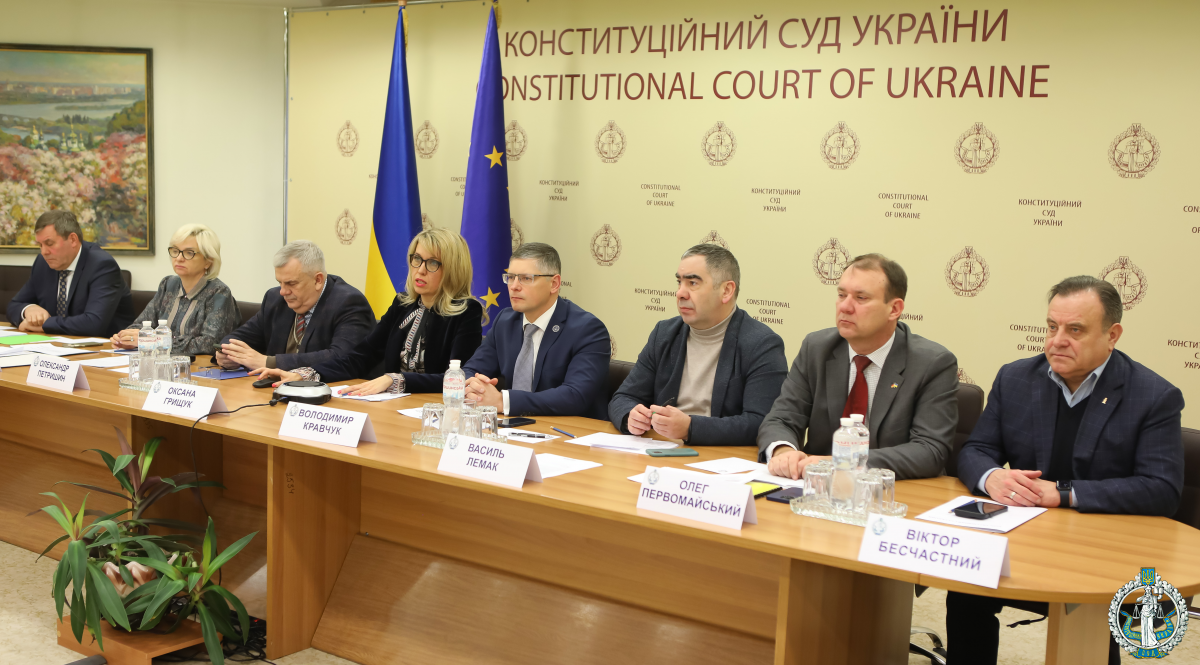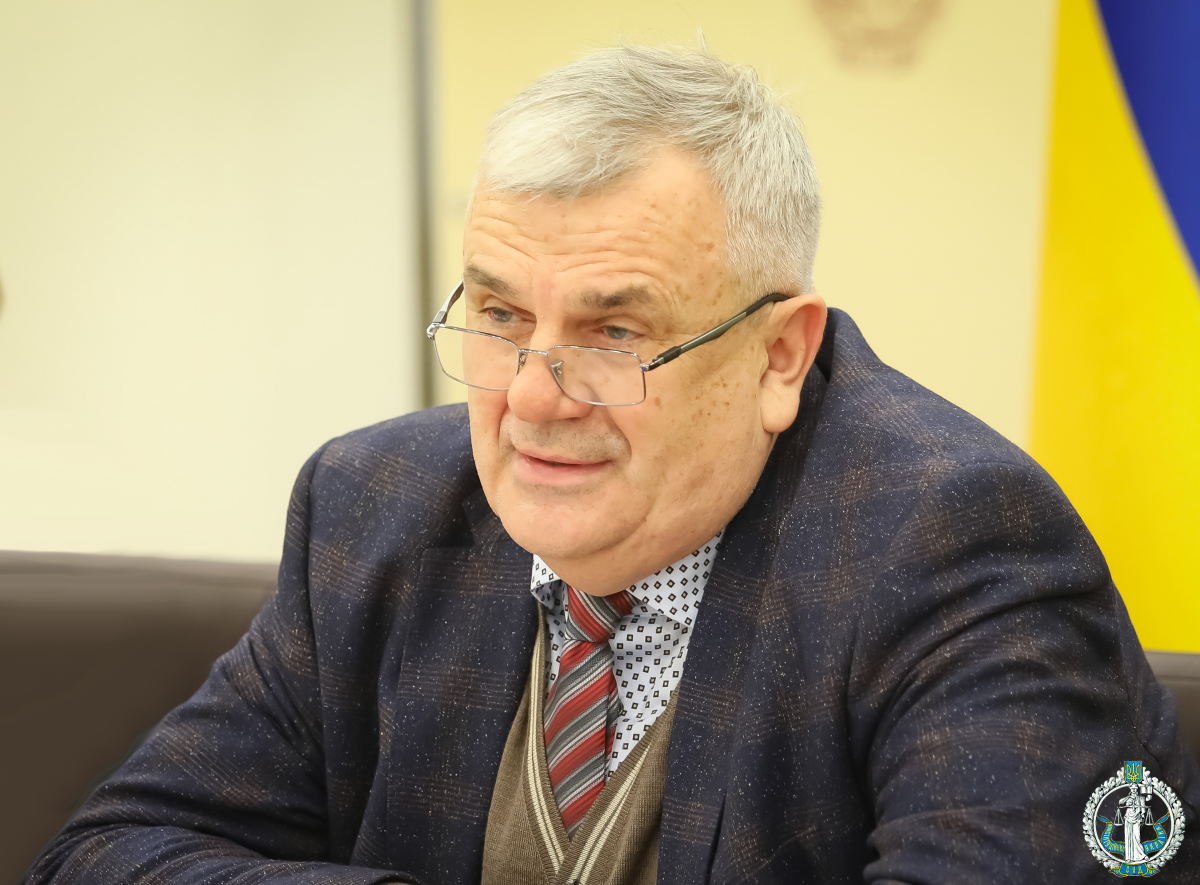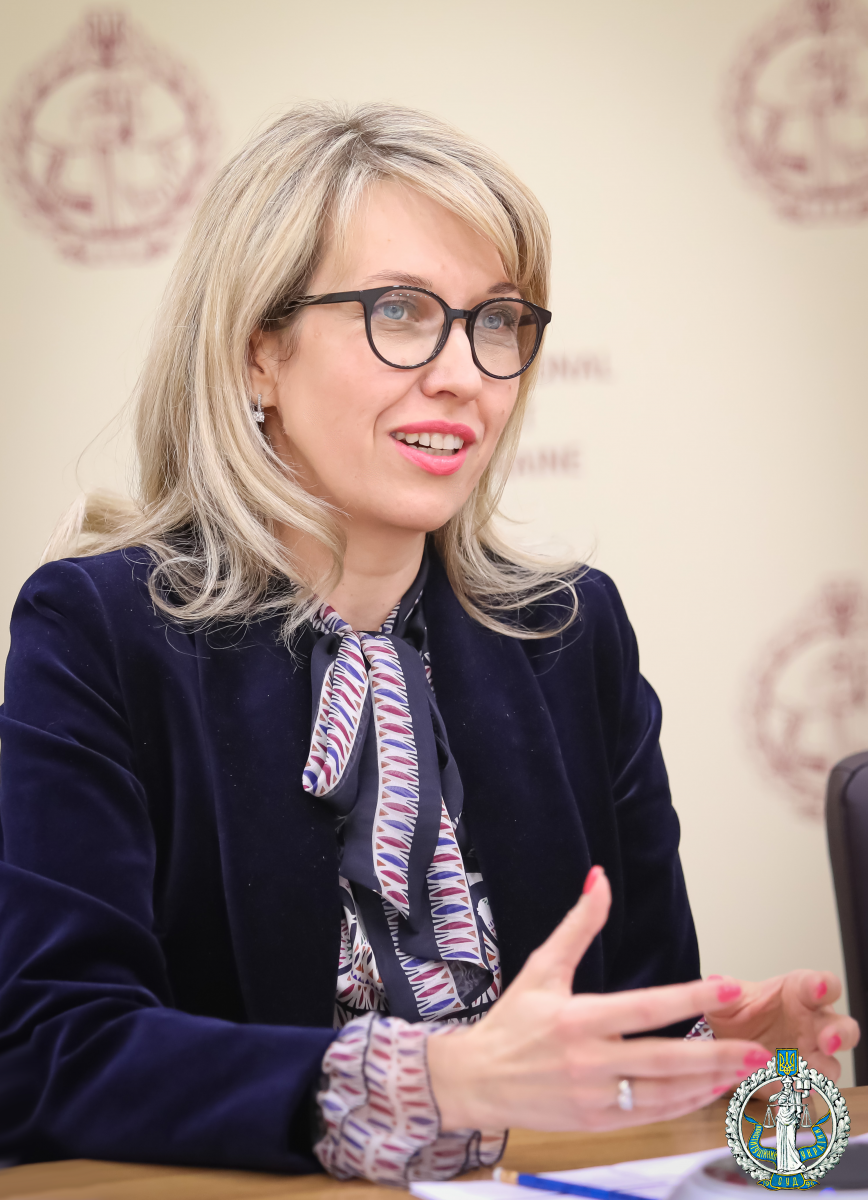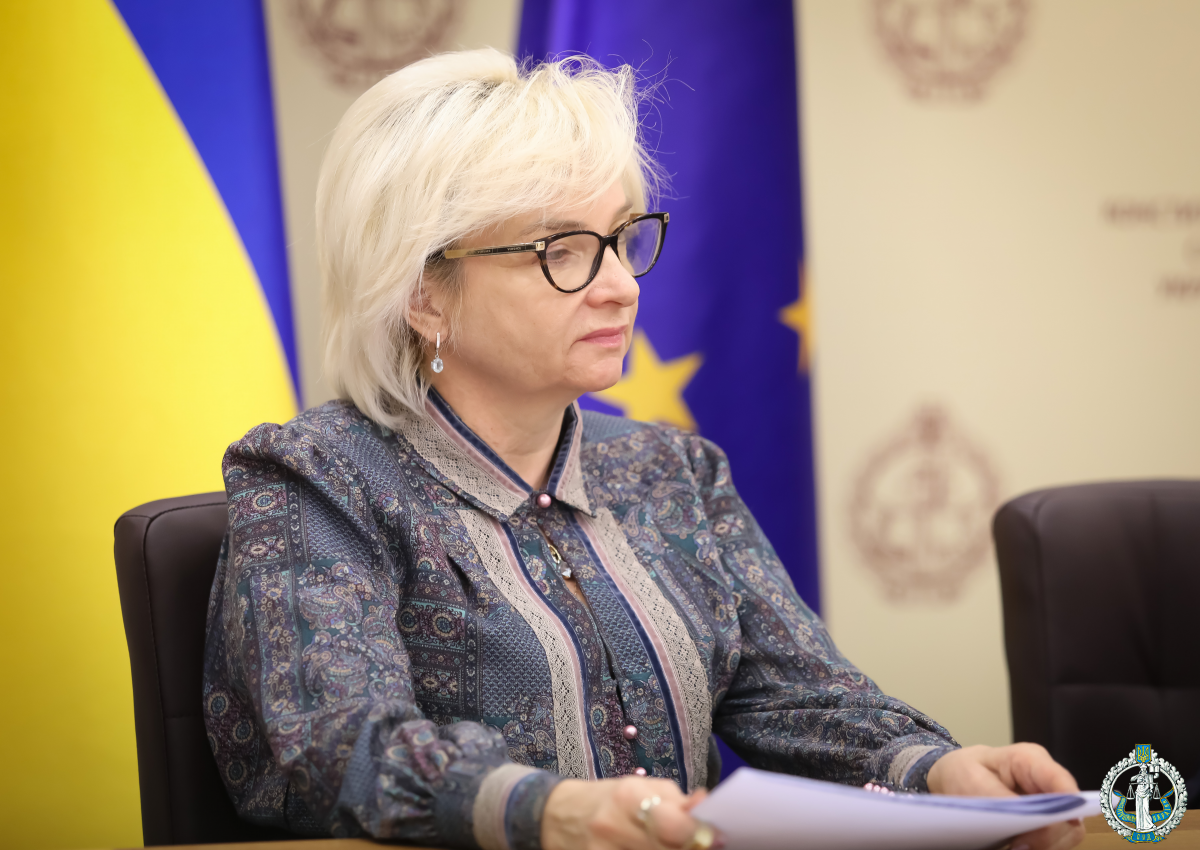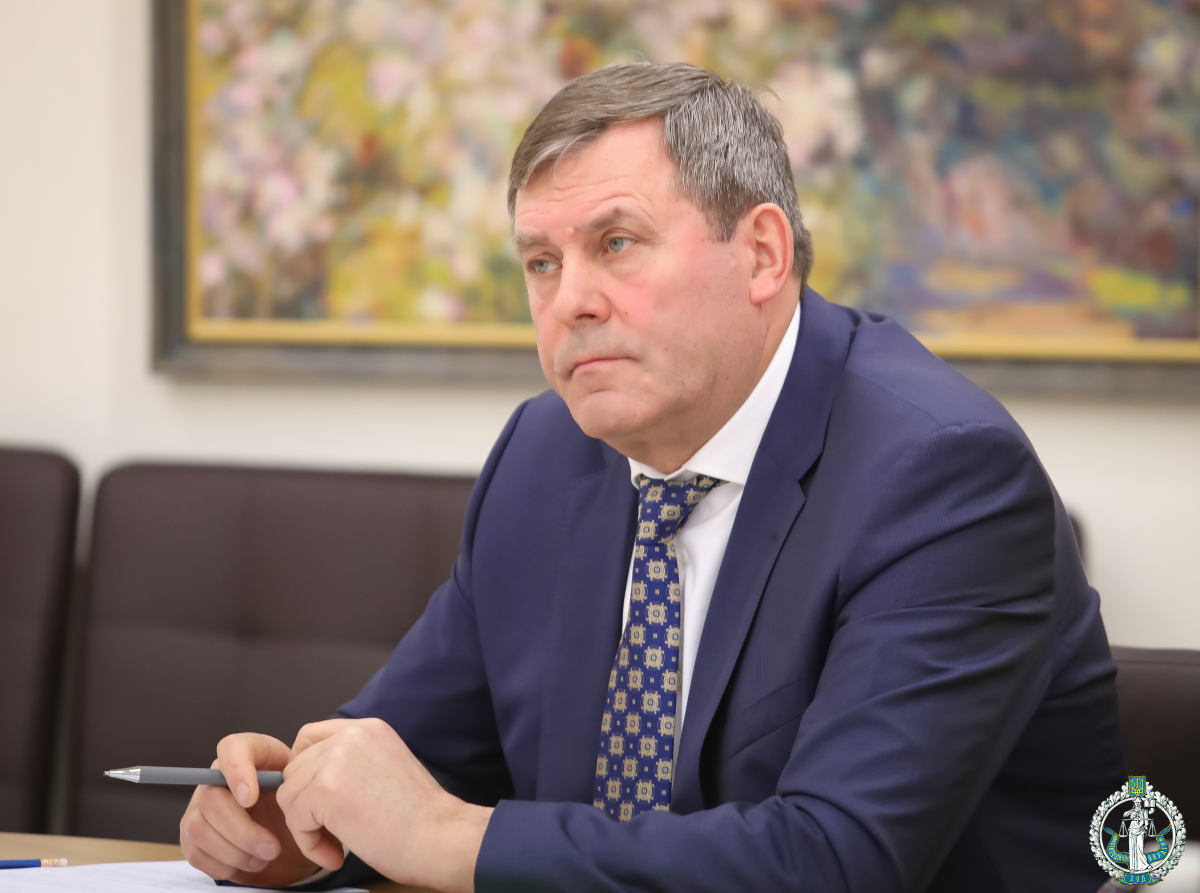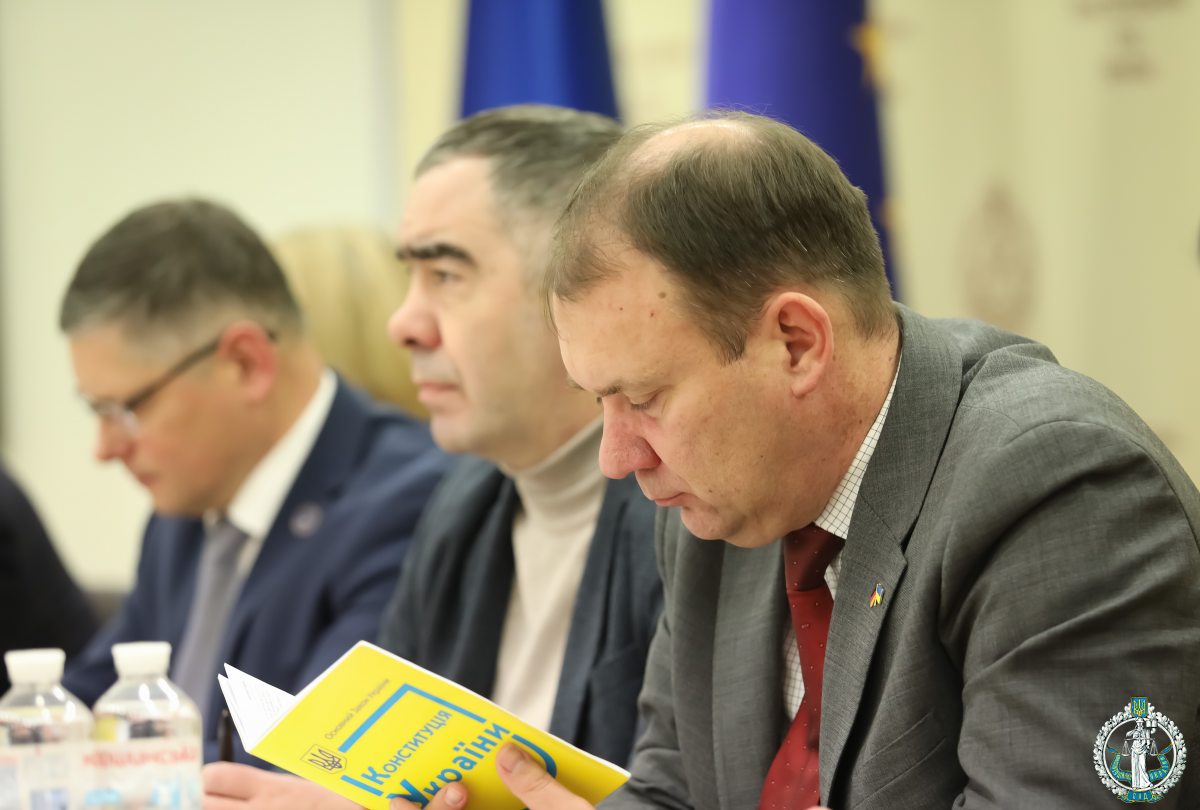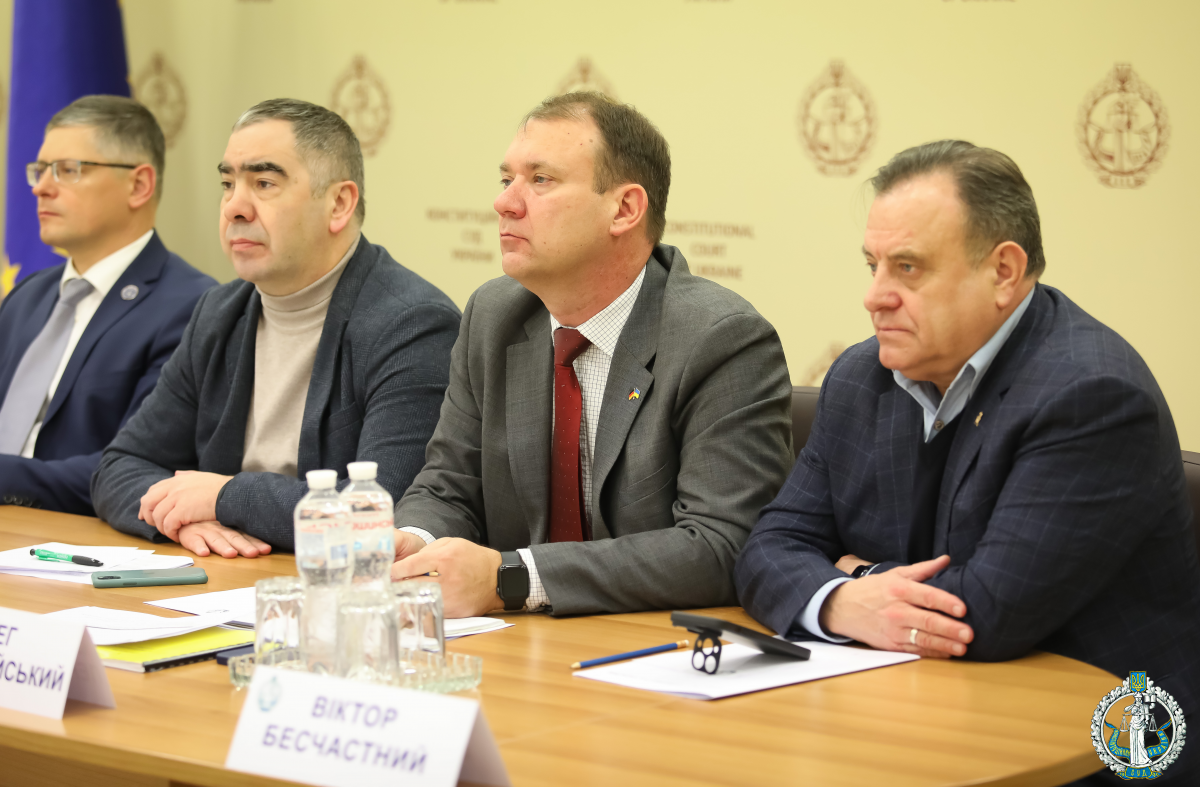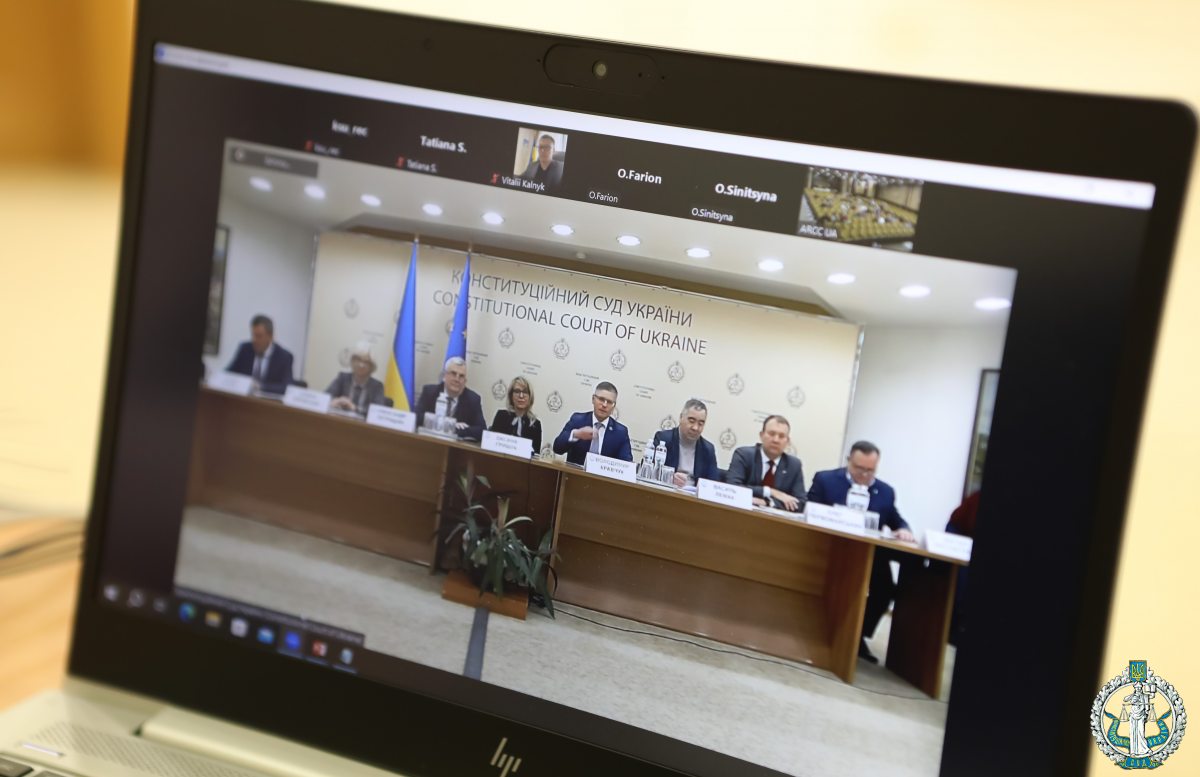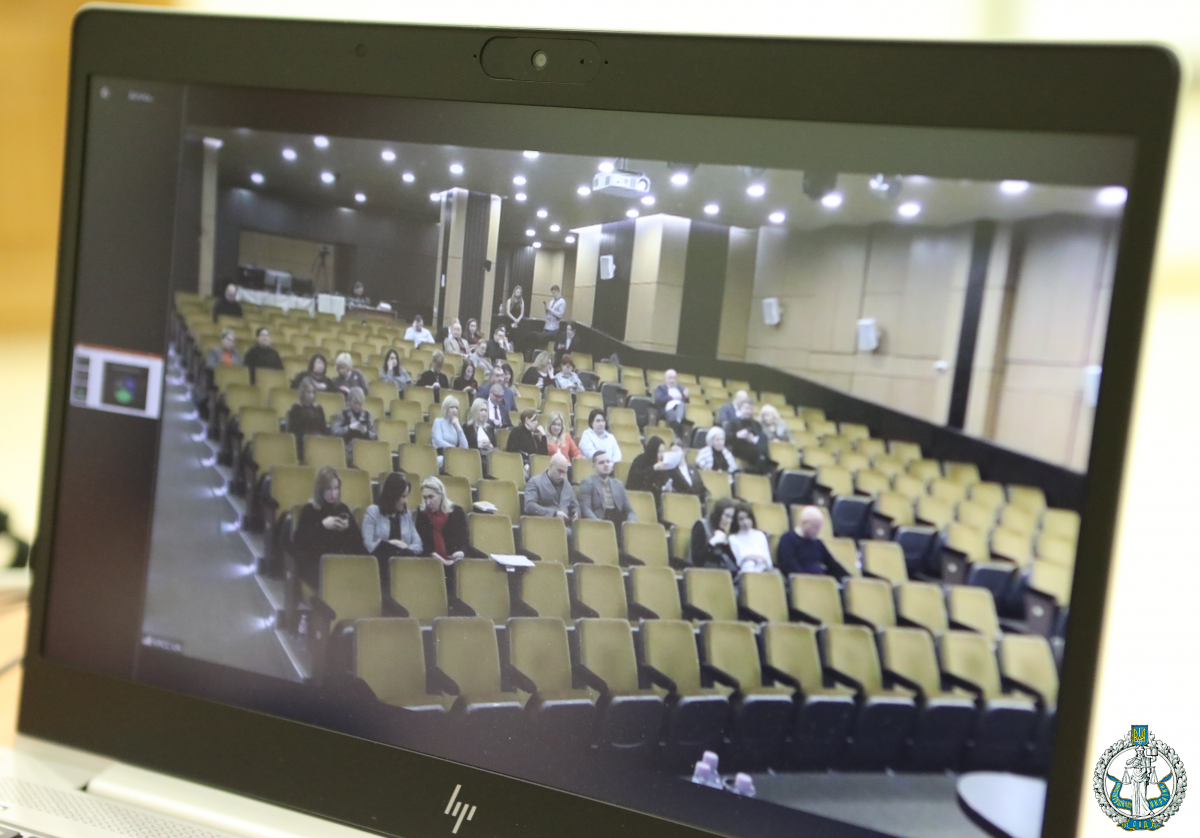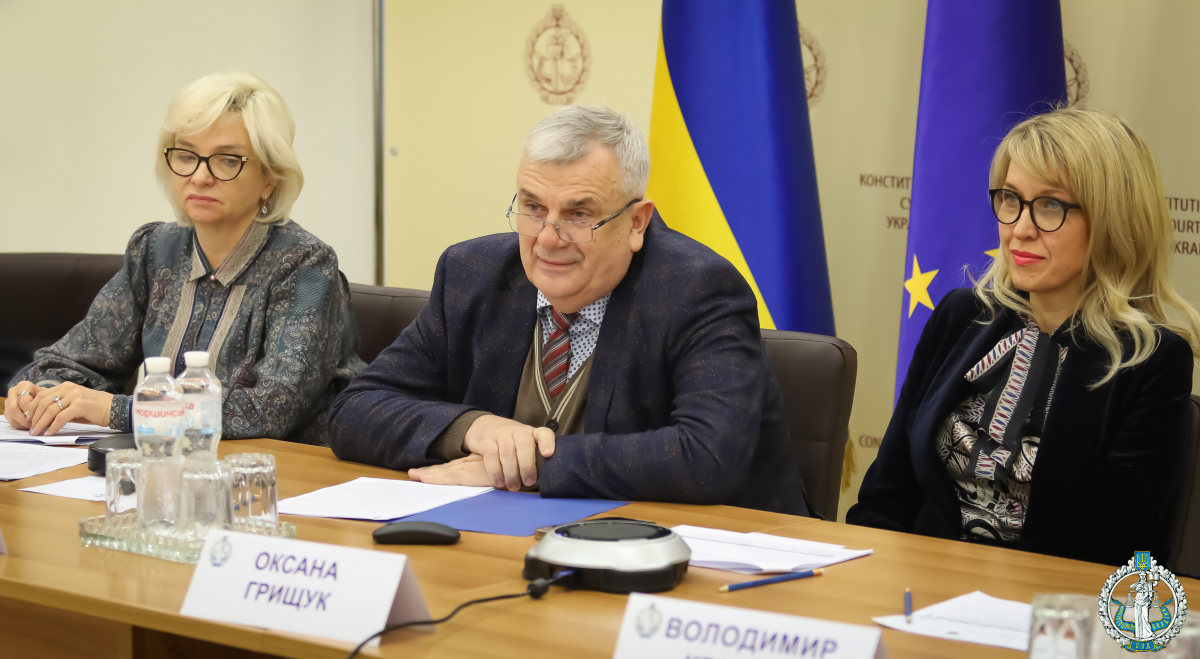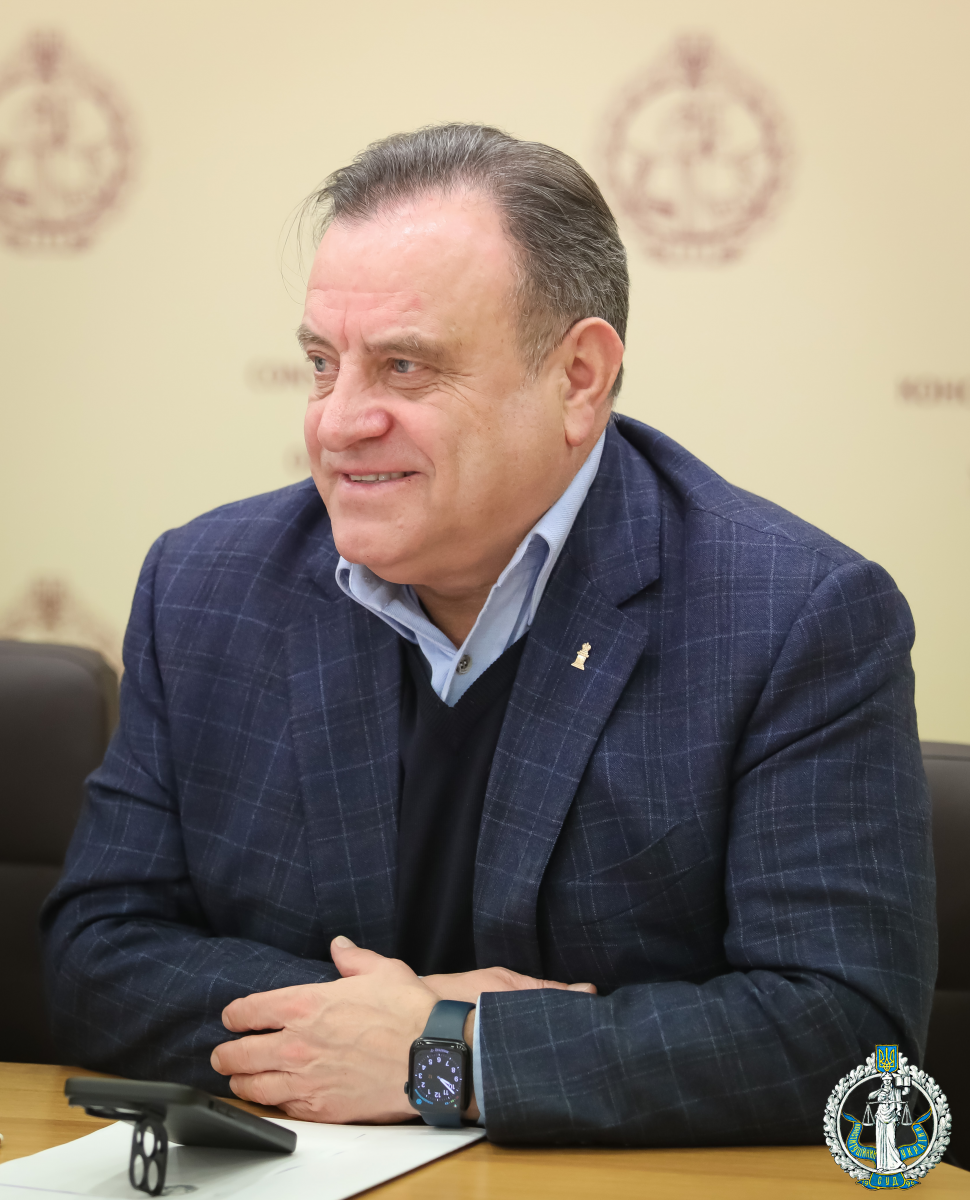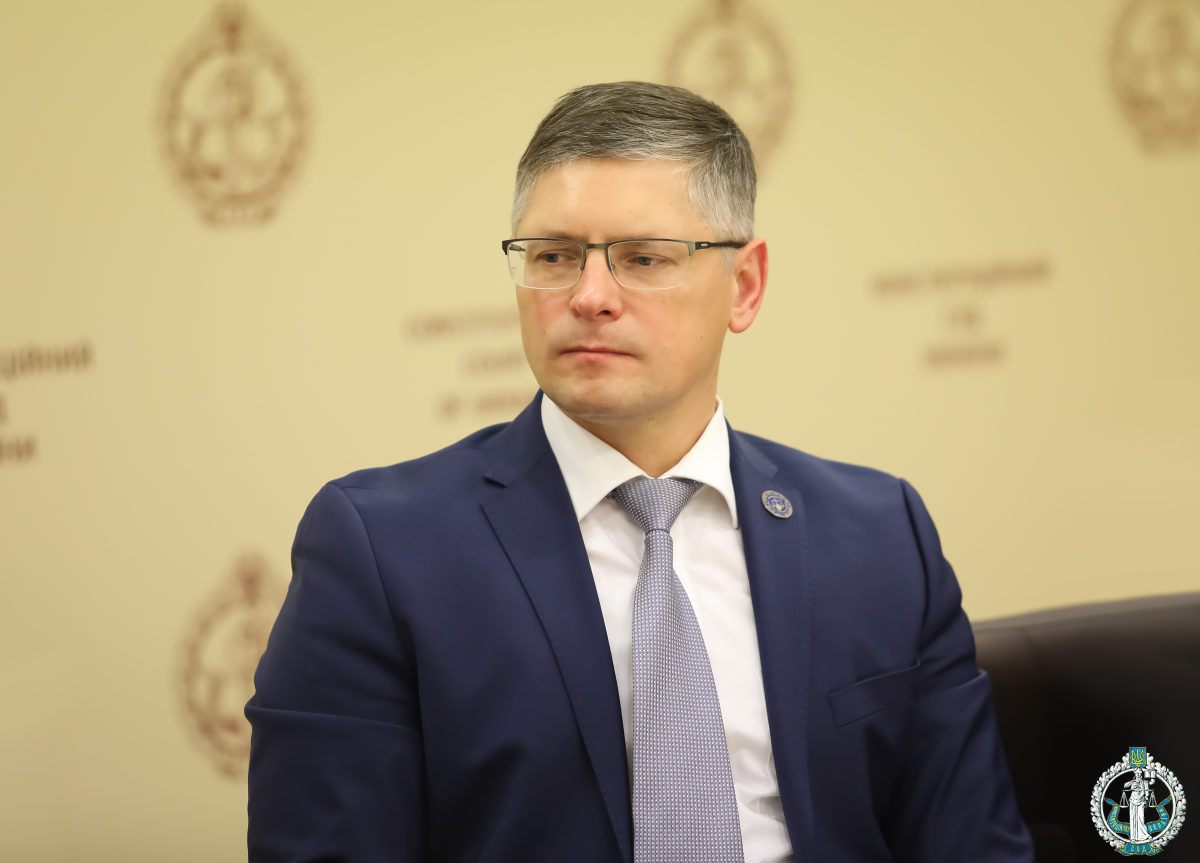Judges of the Constitutional Court of Ukraine, Oksana Hryshchuk, Vasyl Lemak, Oleksandr Petryshyn, Oleh Pervomaiskyi, Petro Filiuk, Galyna Yurovska, and the head of the Court Secretariat, Viktor Beschastnyi, took part in the X National Judicial Forum “Topical issues of deliberation of cases on the protection of citizens' rights under martial law in Ukraine”. The event, which was organised by the Representative Office of the Norwegian Refugee Council (NRC) in Ukraine together with the Association for the Development of Judicial Self-Government of Ukraine, was held on December 11-12, 2023.
Opening the event, the judge of the Constitutional Court of Ukraine Galyna Yurovska addressed the participants with a welcome speech. During the second day of the online forum, judges of the Constitutional Court of Ukraine delivered their presentations. The session was moderated by Volodymyr Kravchuk, judge of the Administrative Cassation Court within the Supreme Court.
In his speech, Oleksandr Petryshyn focused on the issue of interpretation of legal norms; in particular, he talked about its content and origins.
The judge emphasised two aspects of interpretation, the first is awareness, and the second is revealing the meaning of the rules for the understanding of a wide range of persons. According to him, there are always two sides in the process of interpretation: the objective one is what is recorded and the subjective one is the psychological interpretation. “Law is not something objective that exists without the will and consciousness of a person. It needs to be perceived, realised, understood and applied. In this sense, the Constitution, laws and law-enforcement acts are always the result of awareness of social situations, as a result of a certain interpretation”, stressed Oleksandr Petryshyn.
The judge also spoke about the interpretation of legal norms by the Constitutional Court of Ukraine. He stressed that the body of constitutional review of Ukraine interprets the fundamental norms that are the content of the act of the constituent power. In this aspect, Oleksandr Petryshyn named the main caveats in the interpretation of constitutional provisions; in particular, it was about the grounds of interpretation of norms, the priority of literal interpretation, the impossibility of changing the content of the norm.
The judge of the Constitutional Court of Ukraine, Oksana Hryshchuk, in her speech, focused attention on such a constitutional principle as the “rule of law” in the decisions of the Constitutional Court of Ukraine.
She noted that among the legal values that form the basis of a comprehensive interpretation of laws and the Constitution, the principle of the rule of is important. The judge spoke about the decisions of the Constitutional Court of Ukraine, in which the Court develops the concept of the rule of law and expressed her belief that these decisions will become important for judges of the judicial system.
In particular, the speaker noted that in Decision No. 15-rp/2004 in the case regarding the court's appointment of a milder punishment, the Constitutional Court indicated that the rule of law is the rule of law in society. One of its manifestations is that law is not limited to legislation as one of its forms, but also includes other social regulators, in particular moral norms, traditions, customs, which are legitimised and determined by the historically achieved cultural level of society.
The judge noted that the further development of the content of this principle testifies to the transition from an integral approach to an elemental approach in its interpretation, which is implemented through the definition of the main components of the rule of law and can be found in a number of decisions.
Thus, in Decision No. 5-rp/2005 on the permanent use of land plots, the Constitutional Court of Ukraine recognised the following elements of the rule of law: equality and justice, legal certainty, clarity and unambiguity of the legal norm, which ensure its equal application and prevent inevitable arbitrariness. In Decision No. 6-r/2019, the Court defines the rule of law as a mechanism for ensuring control over the use of power by the state and protecting people from arbitrary actions of state authorities, etc.
In Decision No. 1-r/2010, the Court identified the following components of the rule of law: legality, division of state power, popular sovereignty, democracy, legal certainty, fair trial. She also emphasised the components defined by the Venice Commission, which are mandatory elements of the concept of the “rule of law”.
The judge focused special attention on the features of the Ukrainian formula of the rule of law, which is two-fold: according to the first component “the rule of law in Ukraine is recognised”, according to the second – “the rule of law in Ukraine is effective”, and also recalled the decision of the Court, in which the Court determined that human dignity as the source of all human rights and freedoms and their basis is one of the fundamental values of the Ukrainian constitutional system.
The judge of the Constitutional Court of Ukraine, Galyna Yurovska, spoke about the observance of fundamental rights during crisis management.
She noted that in times of crisis, the issue of maintaining a balance between the observance of fundamental human rights and those paradigms of national security that the state must ensure is relevant. According to her, crisis situations threaten the very existence of statehood and the very existence of rights in the state, as well as create political, social and economic instability that affects the very existence of rights. According to the judge, in crises, an important priority is the ability of the Government, Parliament and other bodies of state power to implement all necessary measures to overcome crises while respecting fundamental human rights. She also noted that the Constitutional Court of Ukraine plays an important role in this matter.
Galyna Yurovska focused on the issue of observing constitutional rights and freedoms during the fight against the pandemic, in the conditions of war or state of emergency, including during the occurrence of man-made or military disasters.
She noted that the Constitutional Court of Ukraine considered the issue of admissibility of restrictions on certain constitutional rights in the conditions of the pandemic. In Decision No. 10-r/2020, the Court emphasised that the restriction of constitutional human and citizen’s rights and freedoms is possible in cases established by the Constitution of Ukraine. Such a limitation can be determined only by law - an act adopted by the Verkhovna Rada of Ukraine as the only body of legislative power in Ukraine; the establishment of such a limitation by a bylaw contradicts the Constitution of Ukraine.
The judge spoke about the decisions of the Constitutional Court of Ukraine, which have important social significance for Ukraine during martial law, in particular, this decision in the cases of enhanced social protection of military personnel and the full name of religious organizations.
In her speech, the speaker also focused on the observance and provision of rights during the introduction of a state of emergency, which is also a crisis. The judge noted that Ukraine was already experiencing the consequences of the Chornobyl disaster and the Constitutional Court of Ukraine, in particular, in decisions No. 6-r/2018, No. 1-r(ІІ)/2021, restored social guarantees to victims of the Chornobyl disaster.
The judge also drew attention to the disaster that occurred on June 6, 2023, namely the detonation of the Kakhovka hydroelectric power plant by the occupiers. According to her, it would be expedient to work out certain amendments in the legislation and to equate the consequences of this disaster in the constitutional aspect with the Chornobyl disaster, to strengthen the protection of the property rights of the victims, to develop mechanisms for compensation, legal protection and compensation for damages.
In his speech, the judge of the Constitutional Court of Ukraine Vasyl Lemak talked about the aspects of protecting constitutional democracy, the importance of finding a balance between public interests and the protection of individual human rights.
He emphasised that wars are won by constitutional democracies, when democracy rests on the Constitution, and where the Constitution is respected, the government is strong. The judge observed that in times of war this is even more important than in calm and peaceful times.
Vasyl Lemak noted that during the war, the key problem is to find a balance between the public interest, which we clearly understand today, because it is the protection and defense of our country from external aggression, and the protection of individual human rights. At the same time, according to him, external aggression does not end with the activities of the armed forces of the Russian Federation, it also manifests itself in subversive activities against our democracy, against Ukraine within our state. The judge stressed that the public interest should not be opposed to individual human rights, which must be protected. We need to find a balance.
Vasyl Lemak also analysed key issues such as: information policy and freedom of speech; banning political parties, especially those with ties to the Russian Federation; the issue of holding elections; criminal law policy of the state in the conditions of war, in particular, emphasised the fact that liability for a number of crimes in the field of national security has increased, new types of crimes have appeared, etc. The judge added that according to the Constitution of our state, every person has the right to life, the right to be treated with dignity, etc., but in the temporarily occupied territories, unfortunately, there are no longer any mechanisms for the protection of human rights, since after the de-occupation we see thousands of people killed and tortured.
In this context, the speaker noted the importance of the full-fledged activity of the courts, which should indicate to what extent certain restrictions on individual human rights are justified in the conditions of martial law.
Our main task, Vasyl Lemak pointed out, is to protect constitutional democracy, and he added that only by being a full-fledged constitutional democracy can we gain membership in the European Union.
In his speech, the judge of the Constitutional Court of Ukraine, Oleh Pervomaiskyi, spoke about certain aspects of guaranteeing the right to judicial protection, in particular, he analysed Decision No. 10-r(ІІ)/2023 delivered by the Constitutional Court on November 22 in the case on guaranteeing the right to judicial protection in minor disputes, in which he was a judge-rapporteur.
Oleh Pervomaiskyi noted that the lawmaker applied measures that had flaws in proportionality and the observance of equal rights of participants in procedural relations when regulating the institute of minor disputes. At the same time, he emphasised that the Constitution of Ukraine enshrines the concept of “minor disputes”' and therefore the attempt to record the features of the deliberation of minor cases in the Civil Procedure Code of Ukraine, individual provisions of which were the subject of constitutional proceedings, corresponds to the Constitution.
Considering this, the Constitutional Court of Ukraine granted the Verkhovna Rada of Ukraine six months to regulate procedural relations.
At the same time, considering the issue of the application of this Decision by the judges of the courts of the judicial system until the legislator brings the provisions into compliance with the Court's Decision, Oleh Pervomaiskyi pointed out the expediency of taking into account the Decision of the Constitutional Court and international acts that regulate similar procedural relations and determine the lower threshold for classifying a case as a minor one.
Judge of the Constitutional Court of Ukraine Petro Filiuk devoted his speech to the issue of protecting citizens’ rights under the martial law in Ukraine.
The judge focused attention on the Decision of the Constitutional Court of Ukraine No. 4-r/2020, in which the Court emphasised that the implementation of the principle of the rule of law, the right of everyone to judicial protection is possible only with real observance of the constitutional provisions regarding the independence of judges, which contain legal guarantees aimed at preventing any influence on the judge and the judiciary.
He stressed that in this decision, the Court concluded that the change in the quantitative composition and subjects of appointment of members of the High Qualification Commission of Judges of Ukraine without the introduction of a corresponding transition period led to the suspension of the performance of constitutional functions regarding the selection and evaluation of judges.
According to him, the bearer of judicial power is the judge, however over the last 4 years in Ukraine, almost nothing has changed regarding the qualification evaluation of judges, and, as a result, the state of court staffing is critical, which, of course, affects citizens' access to court. The judge cited statistics that show the shortage of judges in the courts. In addition, he informed that in 2023, 303 judges have already been dismissed, of which 276 are due to resignations. “Courts without judges, this has already become the norm, and this is in the conditions of war,” Petro Filiuk noted.
Concluding his speech, the judge of the Constitutional Court of Ukraine expressed his belief that only we ourselves can organise our affairs. “We must build Ukraine where we were born, where we live and where we work. Ukraine begins with each of us, and therefore everyone should work on their own front and there will definitely be victory,” the judge pointed out.

